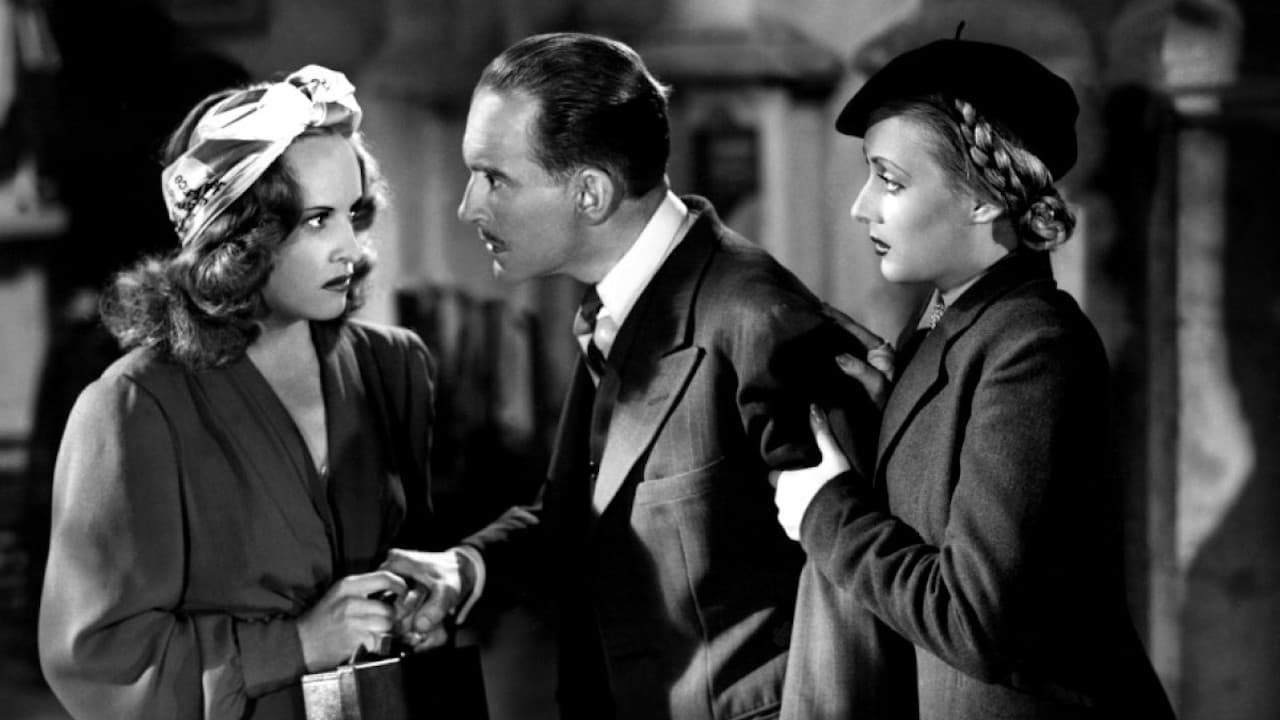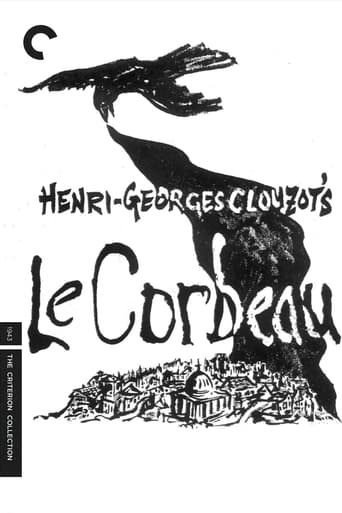ManiakJiggy
This is How Movies Should Be Made
CommentsXp
Best movie ever!
KnotStronger
This is a must-see and one of the best documentaries - and films - of this year.
Phillipa
Strong acting helps the film overcome an uncertain premise and create characters that hold our attention absolutely.
Spikeopath
Le Corbeau is directed by Henri-Georges Clouzot and co-written by Clouzot and Henri Chavance. It stars Pierre Fresnay, Ginette Leclerc, Pierre Larquey and Micheline Francey. Music is by Tony Aubin and cinematography by Nicolas Hayer.We are in a small French town, the actual name of which is not known and is inconsequential. A series of poison pen letters are being sent out to the town dignitaries, accusing them of all sorts of inappropriate operations. The letters are signed by someone calling themselves Le Corbeau (The Raven), and pretty soon the town starts to implode as suspicion and mistrust runs wild.Famously it was the film that saw Clouzot banned from making films, the then young director receiving flak from all quarters of the Vichy Government - Catholic Church - Left Wingers and others too! The asides to the Nazi occupation of France at the time not being acknowledged until some years later. That very theme obviously holds considerable weight, but it's not the be all and end all of Clouzot's magnificent movie.Clouzot and Chavance tap into the troubling fallibility of the human race, portraying a town quickly submerged in moral decay. There is caustic observations on the higher echelons of society, a clinical deconstruction of a town quick to cast aspersions without thinking of consequences, while the script boasts frank intelligence and no fear of censorship. That a town so ripe in respected denizens could become so diseased, so quickly, makes for powerful viewing. All are guilty as well, nobody escapes, even the youngsters are liars or cheats, thieves or rumour spreaders, this be a Hades town where negativity runs rife and leads to broken bodies, broken souls and broken human spirits.Very much a bastion of proto-noir cinema, it's photographed with an awareness to marry up to the acerbic thematic at work. Shadows feature prominently, even in daylight, canted angles are used to great effect, broken mirrors perfectly imbuing the fractures of the human psyche. A number of scenes are startlingly memorable, a funeral procession and a church service interrupted by one of The Raven's letters are superbly staged, the pursuit of a nurse through the cobbled streets is menacing, and the finale is hauntingly raw. Top performances across the board from the cast brings further rewards, whilst simultaneously adding more plaudits to Clouzot's direction. All in all, a remarkable, fascinating and potent piece of cinema. 9/10
morangles29
Cruel and fully aware of it. I was lucky enough to see this movie in the late 60s for the first time; since then, every time, I can watch it, I do!True, there is the sordid story about the Collaboration: who did, who did not? Who could avoid it: probably moving to Brazil would have helped a lot of directors, actors and crews. Yet fleeing France would have been rather lame than face reality. H.G.Clouzot's movie should have been called the Crow, rather than the Raven. Edgar A. Poe gave to the bird some poetic background. on the other hand, the manic croaking of the Crow, like an evil laugh would have been justified as the villain of the movie at one point seems to morph - psychologically- into a crow. Vichy was about hypocrisy. Anti-abortion, bourgeoisie's hidden lies, secret lovers, etc... Somewhere in France, a typical town finds itself obliged to look at its true self. Some people will commit suicide. A lover reveals itself (no spoiler) to be not really loving; the hero seems unable to choose who to court. Until it is revealed that real Love can sacrifice itself. At the end, Justice is served by Love, maternal revengeful Love. Like a goddess from a Greek tragedy. All the actors are doing an amazing job, down to the teenager whose heart is already housing hate and disillusionment. This script deserves a 2012 remake... maybe this time using emails and twitter as mean to weave the tale. Evil is in us and nobody is immune if we do not accept to give some Love back.
robert-temple-1
This was the first of Clouzot's great masterpieces for the screen. It is simply amazing that he managed to pull it off under the noses of the German occupiers, indeed through one of their own production units. The film is a massive frontal attack on the craven Vichy mentality, of turning in one's neighbours, and of the 'informant society' which grows up under any occupying force in any country, but which thrived especially well in the hothouse atmosphere of the typical small French town. Of course, today, we are told that everybody was in the Resistance, but if you add them all up, the Resistance would have been greater than the population of France! In fact, the Resistance was tiny. President Mitterand claimed to have been in the Resistance, but he was later proved to have been a cringeing Vichy boot-licker. If the lies extend as high as the President of France, you can imagine how far and wide they spread lower down. In this film, a series of anonymous poison pen letters, written by an extremely well-informed but clearly deranged person, begin to flood the town. Eventually, hundreds of them are received. No one knows who is doing this, but vicious infighting takes place as a result of their 'information', reprisals and revenge are taken without reflection or hesitation, pretty much par for the course in wartime France. Everybody is inclined to believe everything fed to their feverish and vicious imaginations by the unknown letter writer, who calls himself or herself 'Le Corbeau' ('The Raven'). The whole society is set against itself and starts tearing itself apart on the basis of flimsy and unsubtantiated allegations from an unknown person. Clouzot shows the merciless progression of this herd insanity, even as he lived in the midst of it in his occupied country. When the Nazis realized what a cuckoo had been in their next, they refused to release the film. After the Liberation, the film was still prohibited and Clouzot blacklisted. The fact is that Clouzot had lifted the rock under which all the creepy-crawlies were living and had exposed them to view, and no one could take it, either of left or of right. The fact that he had done it in an entirely nonpolitical way made it even worse, since his target was not any doctrine or dogma but the weaknesses of human nature itself. He not only touched a raw nerve, he twisted it in his fist and made everyone scream with the agony of exposure. This is one of the most despairingly cynical films ever made, a brilliant, horrifying vision of human folly and madness. Clouzot really should have made a film about the Tulip Mania! One must keep in mind that France was the country where the most attention had been called to crowd behaviour and mass insanity, in Gustave Le Bon's famous book 'Psychologie des Foules' (1895, translated into English in 1896 as 'The Crowd', a book prominently reissued in France in 1947 when it was safe to do so). Clouzot and all French intellectuals were well aware of the issues of crowd madness raised by Le Bon half a century earlier, which had made a deep impact of French intellectual life. If Le Bon had been a filmmaker, he might have made 'Le Corbeau' to prove his points. Interwoven with the black and disturbing theme are various stories of corruption going on within the town, including the taking of opium, adulterous liaisons and betrayals, and a seething ferment of vicious living. One poor boy is driven to suicide in his hospital bed by one of the poison pen letters. This film is spell-binding in its portrayal of the underside of human psychology, and of how easily the dark forces erupt.
CantripZ
I fell in love. This film is so damn good it hurts, especially compared to the majority of English language films of the '40s.It's difficult to add much to the comments already made on this classic film (without writing a book on it), and I agree wholeheartedly with the praise it receives.The cinematography is beautiful, the writing is sharp and tight, the cast is superb and from beginning to end it's gripping and intense.I seem to have reacted differently to many on one point, however. Reading through the other comments, I see a plethora of words like dark, misanthropic, disturbing, grim, depressing....Personally, I spent much of this film chuckling to myself (quietly, so I didn't miss a single line of dialogue), gleefully revelling in the wonderfully mordant comedy which lurks just beneath the surface.Does it really present a negative view of people? I would say not. The film states emphatically, over and over, that everyone has faults and flaws.Denise sleeps around. Laura want to, but can't. Rolande misappropriates funds from the post office. Marie Corbin filches morphine from the hospital. Rémy, our protagonist, is an abortionist (and in a Catholic country to boot!).Town officials fill their pockets, drink and doze and dally while they should be working, have affairs and act... like humans.Not evil - flawed. Denise want to be respected. Laura wants to be loved. Rolande wants to live the good life. Marie is fiercely loyal. Rémy is a passionate doctor who acts according to his beliefs.To me, not even "le Corbeau" himself was wholly evil. Vorzet's actions are certainly evil, and their results tragic and catastrophic, but his insanity is pointed out as coolly as the foibles of the other characters. By the good doctor himself, which is a nice touch... one which made me laugh at the end, looking back on the jovial commentary he provides throughout the film.The humour is certainly on the dark side - and somewhat obscured by the emotional impact of the characters and the impetus of the story - but I found that at the heart of the film's darkness is a fundamental affirmation that life is a complex tapestry of good and bad, selfish and altruistic.Nobody is all good or all bad. I honestly believe that. To say so isn't misanthropic or negative - it's just a fact. Neither does such a view condone selfish or destructive behaviour; rather, I would say, it implies a degree of awareness (whether observational or personal) which is more likely to discourage than encourage.After all, if a person doesn't see their own faults, how can they deal with them? Compared to many films (not just of its own era), this is a morally complex tale. It treats all of its characters - from Rémy Germain and "la mère du cancéreux" to Vorzet himself - with a delicacy and sympathy which is unusual and moving.The fact that it's also bitingly satirical and viscerally intense... well, that's just a bonus!

